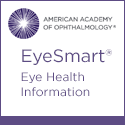What is an ophthalmologist?
An ophthalmologist is a medical doctor with additional specialized training in all aspects of eye care — medical, surgical, and optical.
How is an ophthalmologist different from an optometrist and an optician?
Ophthalmologists are different from optometrists and opticians in their training and in what they can diagnose and treat. As a medical doctor, an ophthalmologist is licensed to practice medicine and surgery. An ophthalmologist diagnoses and treats all eye diseases, performs eye surgery and prescribes and fits eyeglasses and contact lenses.
An optometrist is a doctor of optometry, licensed to practice optometry. Optometrists determine the need for eyeglasses and contact lenses, prescribe optical correction and screen for abnormalities of the eye. In many states, optometrists can prescribe a limited number of drugs to help diagnose and treat certain eye conditions. Optometrists generally do not perform surgery.
An optician, licensed by a state to make optical aids, fits, adjusts and dispenses eyeglasses and other optical devices with written prescriptions of a licensed ophthalmologist or optometrist.
How does an ophthalmologist become certified?
After four years of college and eight additional years of medical education and training, an ophthalmologist must pass a rigorous two-part examination given by the American Board of Ophthalmology.
When should I see an ophthalmologist?
You should have your eyes examined by an ophthalmologist if you have:
- Decreased vision, even if temporary
- New floaters (black spots or specks in the vision)
- Flashes of light
- A curtain or veil blocking your visionHaloes (colored circles around lights)
- An eye injury or eye pain
- Bulging of one or both eyes
- Crossed eyes
- Double vision
- Loss of peripheral (side) vision
- Diabetes mellitus
- Thyroid disease-related eye problems (Graves’ disease)
- A family history of eye disease
You should also see an ophthalmologist if your family doctor, pediatrician, or internist refers you to one.
When there are no particular problems, recommended intervals for eye examinations are:
Newborn, pre-school and pre-teen
Eye exams should be given by a pediatrician, family doctor or ophthalmologist at the following intervals:
- newborn to 3 months
- 6 months to 1 year
- 3 years old
- 5 years old
- later as needed
20 to 29 years of age
At least once during this period; African Americans, because of greater risk for glaucoma, should be seen every three to five years
30 to 39 years of age
At least twice during this period; African Americans, because of greater risk for glaucoma, should be seen every two to four years
40 to 64 years of age
Every two to four years
65 years or older
Every one to two years


